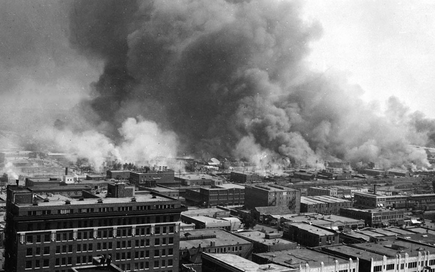Bowles: Oklahoma, Texas reveal nationwide problem with racial bias

United States Library of Congress / Public domain
An image of the Tulsa Race Riot that killed over 300 people despite never being taught before in Oklahoma schools.
February 27, 2020
In 1921, after the smoke cleared in Tulsa, Oklahoma, 300 people lay dead–almost all African Americans. More than 1,000 homes were burned and looted, and the alleged sexual assault committed by a black man that sparked the violence turned out to be completely fabricated. Known as the Tulsa Race Massacre, imagine Emmett Till times 300.
The catch? Almost nobody has heard of it, mainly due to history textbooks completely repressing the information for almost 100 years.
Just last week, the state of Oklahoma finally decided to incorporate the massacre into its state history curriculum. The worst part is that the race massacre is just one example of racial violence being glossed over or completely ignored in many states’ history curricula and merely serves as a microcosm of a much larger issue.
That issue? Large history publications and local school boards either purposely inserting bias into textbooks or intentionally altering curricula to ignore the plight of minority groups.
Sadly, the main group being ignored and misrepresented, African Americans, have already been plagued by stereotypes and racism for hundreds of years. These textbooks either incorrectly portraying their history or ignoring it altogether are the archetype of adding insult to injury.
Many textbooks improperly represent other parts of history as well, especially that of Latinxs and Native Americans. For example, in 2014, a proposed set of Texas textbooks included several blatant misrepresentations of Native American history.
One Pearson textbooks states, “Priests came to Mexico to convert Native Americans to the Roman Catholic religion. The Church became an important part of life in the new colony. Churches were built in the centers of towns and cities, and church officials became leaders in the colony.”
It completely fails to mention forced conversion to Christianity many Native Americans underwent, as well as the conversion’s goal of eroding Native American culture and traditions.
These books take a completely Eurocentric view on historical events, ignoring the plight of minorities and their struggle throughout American history. This spread of misinformation is extremely problematic because many American students get a slightly or even extremely skewed view of history, leading them to believe minority groups are exaggerating their struggles.
In 2012, an Atlanta elementary school asked students in a homework assignment, “If Frederick got two beatings per day, how many beatings did he get in one week? Two weeks?”
Even more recently, in 2018, a San Antonio textbook asked students to list the positives and negatives of slavery and even argued that not all slave owners were cruel, despite them literally owning human beings.
I fail to see how any human can be thought of benevolent if they own another person. No matter how well you treat them, you are taking away their fundamental right to freedom, forcing them to work against their will and forcing their children to do the same.
One company that has repeatedly come under fire, McGraw-Hill, had one of the worst blunders in 2015.
“The Atlantic Slave Trade between the 1500s and 1800s brought millions of workers from Africa to the southern United States to work on agricultural plantations,” their book stated.
It is a simple and undeniable fact that they were not simply “workers,” but slaves. They were human beings with feelings forced to work in terrible conditions and frequently beaten. Again, statements like these strongly downplay the evils of African American slavery in the United States and only serve to feed racism across the southern U.S.
Worst of all, this racial bias is never explicitly stated. It’s in the slight alteration of key phrases and omission of important events that people begin to become less flexible in their racial biases. Many students will forget what their textbook said, but they won’t forget how they said it.
In her book “America Revised,” journalist and historian Frances FitzGerald eloquently states the effect of this implicit bias.
“What sticks to the memory from those textbooks is not any particular series of facts but an atmosphere, an impression, a tone. And this impression may be all the more influential just because one cannot remember the facts and the arguments that created it.”
America needs to come to terms with all of its many evils and mistakes. This process begins in the classroom, and until our students are truly informed, this nation will remain plagued by racial strife.









